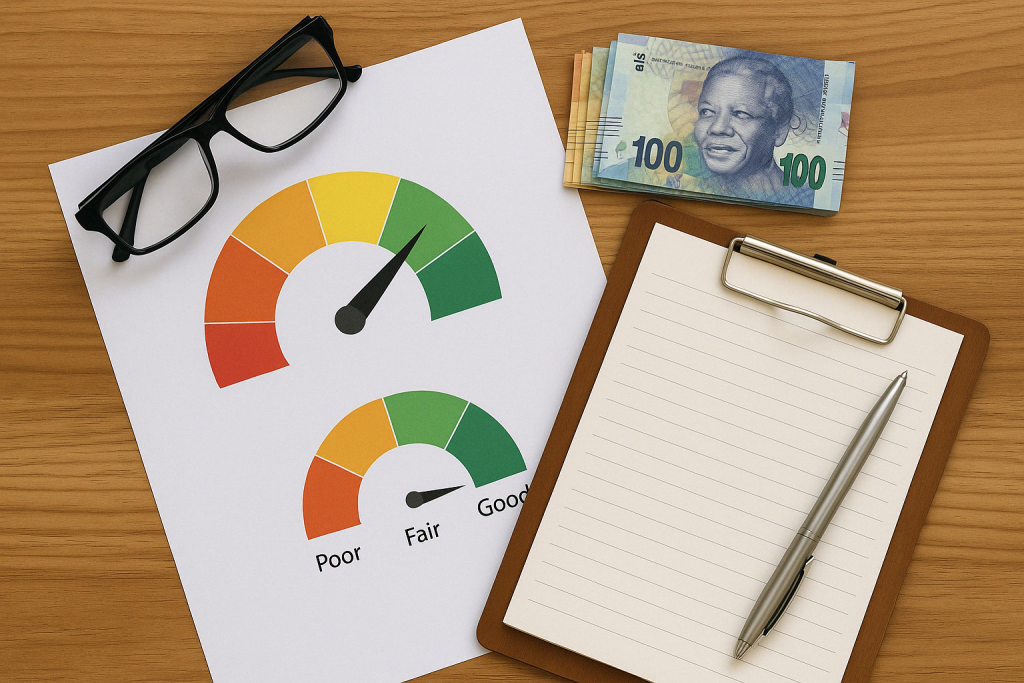Building and maintaining a solid credit score in South Africa is crucial for achieving financial freedom. Your credit score determines not only your eligibility for loans and credit cards but also influences the interest rates you receive. Establishing a good credit history can seem daunting, but with the right strategies and persistence, you can significantly boost your financial health.
For many, a healthy credit score opens doors to more significant opportunities, such as buying a home or starting a business. Your creditworthiness reflects how responsible you are with credit and impacts various aspects of financial life. Despite its importance, many South Africans are unaware of how to manage or improve their scores effectively.
Understanding your credit score

Understanding your credit score involves knowing how it’s calculated and how it impacts your financial transactions. In South Africa, credit scores range between 300 and 850, with higher scores indicating better creditworthiness. These scores are derived from various factors, primarily your payment history, the amount of debt you owe, and the length of your credit history. Familiarizing yourself with your credit report is crucial for identifying and rectifying any discrepancies.
It’s beneficial to understand the specific elements that affect your score. Payment history notably accounts for a large portion of your score, highlighting the importance of consistently paying bills on time. The amount of debt you carry relative to your credit limits, known as your credit utilization ratio, also plays a significant role. Managing these aspects thoughtfully can prevent negative impacts on your credit status.
Improving your financial habits can naturally lead to a better credit score. Focus on reducing outstanding debts and maintaining low balances on credit cards. This balance management helps improve your credit utilization ratio, giving a positive impression of your financial discipline. Diversifying your credit accounts responsibly, including credit cards and loans, can also reflect well on your credit profile.
Why tracking your credit score is essential
Regularly tracking your credit score enables you to take proactive measures to maintain or improve it. By keeping an eye on your score, you can swiftly identify any negative trends or potential inaccuracies in your credit report. This awareness is particularly crucial when planning significant financial decisions, such as applying for a mortgage or auto loan.
Besides immediate benefits, consistent tracking helps instill sound financial behavior over time. Observing your credit score’s fluctuations can motivate more disciplined financial practices, such as timely payments and judicious credit usage. Furthermore, being informed about your standing allows for strategic planning, ensuring you remain eligible for favorable interest rates and financial products.
Ultimately, making credit score tracking a regular habit fortifies not just short-term goals but also sets the foundation for sustained financial health. The more actively you engage with your financial data, the more empowered you become in safeguarding your economic future. Awareness paired with action leads to profound improvements and financial resilience that benefits you and your family’s well-being.
Tools and resources to maintain a good credit score
Utilizing tools and resources can significantly enhance your ability to maintain a healthy credit score. Free online platforms, such as TransUnion and Experian, offer South Africans an opportunity to check their credit reports. These tools provide detailed insights into your credit activities, helping you understand what factors are contributing to or detracting from your score.
Managing credit wisely is not limited to monitoring services. Budgeting apps provide crucial insights into income and expenditure patterns, allowing you to set more realistic financial goals. They help ensure you’re setting aside necessary funds to pay off debts incrementally, thereby improving your credit status.
Foreshadowing your financial behavior with these resources makes maintaining a good credit score much more feasible. Proactively engaging with available tools reduces the unpredictability of financial stressors and empowers you to nurture a healthier relationship with credit. You gain not only immediate improvement but also the knowledge and tactics required for progressive financial success.
Steps to build a solid credit history
Building a robust credit history requires dedication and strategic management of existing debts and financial products. Begin by ensuring all bills and existing credit obligations are paid on time. These payments form the backbone of your credit score, establishing a reputation of reliability. Avoid taking on unnecessary debt while focusing on reducing existing balances progressively.
Maintain a diversified credit portfolio strategically by cautiously incorporating different types of credit, such as revolving credit and installment loans. This diversity demonstrates your capability to manage varying financial responsibilities effectively. Develop a habit of routinely applying for new credit only when absolutely necessary, as frequent inquiries can potentially lower your score.
Remember, patience and persistence are vital in nurturing an impressive credit history. The effort you invest today lays the groundwork for future financial opportunities, allowing you to pursue larger financial goals with confidence. As your credit score transforms into a powerful financial tool, it opens the gateway to securing advantageous terms on loans and reducing the overall cost of borrowed funds.



